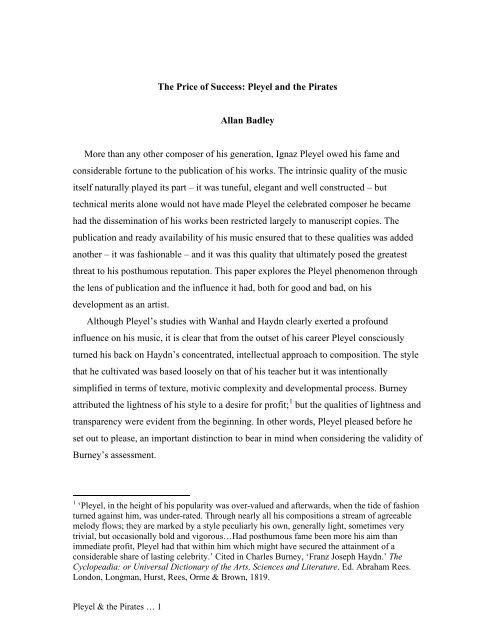Pleyel & the Pirates.pdf - ResearchSpace@Auckland
Pleyel & the Pirates.pdf - ResearchSpace@Auckland
Pleyel & the Pirates.pdf - ResearchSpace@Auckland
Create successful ePaper yourself
Turn your PDF publications into a flip-book with our unique Google optimized e-Paper software.
The Price of Success: <strong>Pleyel</strong> and <strong>the</strong> <strong>Pirates</strong><br />
Allan Badley<br />
More than any o<strong>the</strong>r composer of his generation, Ignaz <strong>Pleyel</strong> owed his fame and<br />
considerable fortune to <strong>the</strong> publication of his works. The intrinsic quality of <strong>the</strong> music<br />
itself naturally played its part – it was tuneful, elegant and well constructed – but<br />
technical merits alone would not have made <strong>Pleyel</strong> <strong>the</strong> celebrated composer he became<br />
had <strong>the</strong> dissemination of his works been restricted largely to manuscript copies. The<br />
publication and ready availability of his music ensured that to <strong>the</strong>se qualities was added<br />
ano<strong>the</strong>r – it was fashionable – and it was this quality that ultimately posed <strong>the</strong> greatest<br />
threat to his posthumous reputation. This paper explores <strong>the</strong> <strong>Pleyel</strong> phenomenon through<br />
<strong>the</strong> lens of publication and <strong>the</strong> influence it had, both for good and bad, on his<br />
development as an artist.<br />
Although <strong>Pleyel</strong>’s studies with Wanhal and Haydn clearly exerted a profound<br />
influence on his music, it is clear that from <strong>the</strong> outset of his career <strong>Pleyel</strong> consciously<br />
turned his back on Haydn’s concentrated, intellectual approach to composition. The style<br />
that he cultivated was based loosely on that of his teacher but it was intentionally<br />
simplified in terms of texture, motivic complexity and developmental process. Burney<br />
attributed <strong>the</strong> lightness of his style to a desire for profit; 1 but <strong>the</strong> qualities of lightness and<br />
transparency were evident from <strong>the</strong> beginning. In o<strong>the</strong>r words, <strong>Pleyel</strong> pleased before he<br />
set out to please, an important distinction to bear in mind when considering <strong>the</strong> validity of<br />
Burney’s assessment.<br />
1 ‘<strong>Pleyel</strong>, in <strong>the</strong> height of his popularity was over-valued and afterwards, when <strong>the</strong> tide of fashion<br />
turned against him, was under-rated. Through nearly all his compositions a stream of agreeable<br />
melody flows; <strong>the</strong>y are marked by a style peculiarly his own, generally light, sometimes very<br />
trivial, but occasionally bold and vigorous…Had posthumous fame been more his aim than<br />
immediate profit, <strong>Pleyel</strong> had that within him which might have secured <strong>the</strong> attainment of a<br />
considerable share of lasting celebrity.’ Cited in Charles Burney, ‘Franz Joseph Haydn.’ The<br />
Cyclopeadia: or Universal Dictionary of <strong>the</strong> Arts, Sciences and Literature. Ed. Abraham Rees.<br />
London, Longman, Hurst, Rees, Orme & Brown, 1819.<br />
<strong>Pleyel</strong> & <strong>the</strong> <strong>Pirates</strong> … 1














